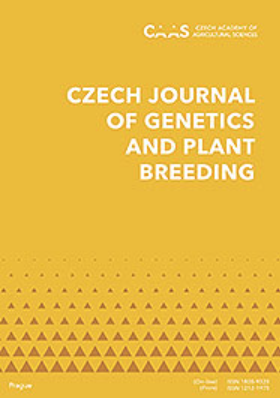Association of leaf chlorophyll content with the stay-green trait and grain yield in wheat grown under heat stress conditions
IF 1.8
4区 农林科学
Q3 AGRONOMY
引用次数: 8
Abstract
Heat stress is a major production constraint of wheat in South Asia, particularly in the Gangetic plains of India and Bangladesh. The leaf chlorophyll status is a key determinant for a high rate of photosynthesis under stress. The present experiments included 238 genotypes in 2016–2017 and 321 genotypes in 2017–2018 under optimum and under heat stress conditions. Subsequently, a set of 100 genotypes selected on basis of the heat susceptibility index was evaluated in 2018–2019 under heat stress conditions to study the relationship between important physiological traits and yield under stress. A significant correlation of soil plant analysis development (SPAD) value of the two upper leaves with stay-green trait and grain yield indicates the importance of chlorophyll content, both in flag and penultimate leaf, in maintaining leaf areas under greenness (LAUG) and grain yield under heat stress. The SPAD in the flag and penultimate leaf was responsible for 8.8% and 10.9%, respectively, of the variation in grain yield. For the stay-green trait, 8.4% and 7.2 % of the variation was governed by the SPAD value in the flag and penultimate leaf, respectively. These results suggest that, in addition to the flag leaf, the chlorophyll status of the penultimate leaf can be an important criterion for the selection of superior wheat genotypes under heat stress. The genotypes SW-139; SW 108; DWR-F8-35-9-1; NHP-F8-130; DWR-F8-3-1 that maintained a high chlorophyll content in the flag and penultimate leaf can be used further in breeding programmes addressing heat resistance in wheat.热胁迫条件下小麦叶片叶绿素含量与保绿特性及产量的关系
热应激是南亚小麦生产的主要制约因素,特别是在印度和孟加拉国的恒河平原。叶片叶绿素状态是胁迫下高光合速率的关键决定因素。本实验在最佳和热胁迫条件下,选取了2016-2017年的238个基因型和2017-2018年的321个基因型。随后,在2018-2019年热胁迫条件下,根据热敏感性指数筛选100个基因型,研究胁迫下重要生理性状与产量的关系。上叶土壤植物分析发育(SPAD)值与保绿性状和籽粒产量呈显著相关,表明旗叶和倒数叶叶绿素含量在热胁迫下维持绿叶面积(LAUG)和籽粒产量方面具有重要意义。旗叶和倒数叶SPAD分别占籽粒产量变异的8.8%和10.9%。在留绿性状中,旗叶和倒数叶的SPAD值分别占变异的8.4%和7.2%。这些结果表明,除旗叶外,倒数第二叶的叶绿素状态可以作为热胁迫条件下小麦优良基因型选择的重要标准。基因型SW-139;SW 108;DWR-F8-35-9-1;额定马力- f8 - 130;在旗叶和倒数叶中保持较高叶绿素含量的DWR-F8-3-1可以进一步用于小麦耐热性育种计划。
本文章由计算机程序翻译,如有差异,请以英文原文为准。
求助全文
约1分钟内获得全文
求助全文
来源期刊

Czech Journal of Genetics and Plant Breeding
Agricultural and Biological Sciences-Plant Science
CiteScore
2.20
自引率
0.00%
发文量
25
审稿时长
>12 weeks
期刊介绍:
Original scientific papers, critical reviews articles and short communications from the field of theoretical and applied plant genetics, plant biotechnology and plant breeding. Papers are published in English.
 求助内容:
求助内容: 应助结果提醒方式:
应助结果提醒方式:


